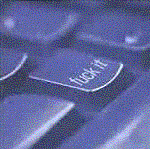My work is stressful. Usually, when I get home, the first thing on my mind is "everything but thinking". Which invariably ends with me parking my ass on the couch to watch the telly.
It seems, last friday, my brain did not appreciate this kind of "switch brain on, switch brain off" behaviour. Plus, the stuff in the tv was even more brain-cell-killing than usual, so I guess my brain started working in pure self-defense.
It started off as one of those musings about "yeah. I wanna learn new languages someday." You know, one of these half-assed things you tell yourself you'll do once you have "the time", "the money"? Like rock climbing, doing sports, calling your great-aunt? Yeah, if you're anything like me, you'll never do any of those things.
I lazily surfed the web for some good vocabulary trainer. byki seemed like a good idea, what with the shared lists and stuff. Then I found Rosetta Stone software, which I found awesome - until I saw the price tag attached, that is. Because as much as I like to learn Spanish in a very natural way, I'm not paying 699 US $ for it. Because for 699 $, I fully expect this software not only to teach me foreign languages, but also to shine my shoes, wash my car, and do my taxes.
Conclusion: I'm either too cheap or too poor to learn languages. Plus, I'm lazy. Time to reevaluate my assets. How about a quick-and-dirty-method? You're a programmer. Not a particularly good one, but it's enough to draft together a little app to teach yourself. By combining the list idea of byki and the "learn-by-show-and-tell", and some easy vocabulary lists, some stuff that means the same in every language. Can't be THAT hard.
Yeah, that's the point where the linguists in my readership probably burst out laughing. You know, if there actually were linguists in my readership. Or if I HAD a readership, but anyway.
The thing is, I wanted some basics, to make yourself comprehensible in a foreign country, a kind of Pidgin, if you will. For example, "[Ich-sehen-rot-Auto-vorn-links]" (=[I-see-red-car-front-left]) is not correct German, since you lose all the conjugations and stuff (It would be something like "Ich sehe ein rotes Auto (da) vorne links"), but people would be at least able to communicate simple concepts, such as "Can you point me to the airport", or "help, I need to find a police officer!". Or at the very least, "Where's the bathroom?" - because, do you really wanna take a dump in the middle of the Champs-Élysées just because you can't figure out how to get people to point at the nearest loo? I mean, tourists have a bad enough image as it is.
The problems, however, start at the very core of the language, with such as words as "to be". Because, "I am in the garden"/[I-be-in-garden] translates easily into German as "Ich bin im Garten"/[Ich-sein-in-Garten].
But: "yo soy en el jardin"/[yo-ser-in-jardin] won't work, since to a native spanish this would imply "I am the garden." So unless you don't want some Spanish to think you're trying to invent a new verse to a certain Simon & Garfunkel song, you have to use the correct verb "estar".
So, essentially, to get a list of common simple words that won't have a double meaning. Well, that's a necessary database approach. This bloats your entries however. Plus, you lose stuff, since if you don't learn that "be" means both "estar" and "ser", you won't use it, and get confused if the natives do. So you'd need links. This all combined with the original idea of using simple pictograms so you'll learn the word naturally instead of simply translating it. And this is not even counting pitfalls like double meaning or false friends....This might need a teensy bit more work than I thought it would.
Meh. Now my head hurts. See, kids? This is what thinking will get you.
Saturday, September 11, 2010
Subscribe to:
Post Comments (Atom)

No comments:
Post a Comment